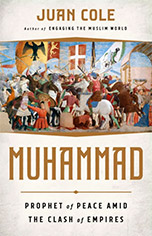The Qur’an, the Muslim scripture recited by the Prophet Muhammad 610-632 AD, preaches ecumenical harmony.
The Cow 2:113 castigated Jews and Christians for each denying the truth of the other’s religion, even though they both believe in the Bible:
- “The Jews say, ‘The Christians have nothing to stand on’; and the Christians say, ‘The Jews have nothing to stand on’—even though they both recite the Bible.”
It goes on to scold them for violently attacking one another’s religious edifices:
- “Who is more of a despot than one who forbids the mention of God’s name in the houses of God, and strives to tear them down? They should not have entered them save in fearful reverence. Their lot in this world is disgrace, and in the next they face severe torment.” (The Cow 2:114)

I believe that the context of this instruction that churches and synagogues both be reverenced by Jews and by Christians is the war between Iran and the eastern Roman Empire.
I wrote about this issue in my new book, just out:

Muhammad: Prophet of Peace amid the Clash of Empires
*Now* available for order at Barnes and Noble
And Nicola’s Books in Ann Arbor
And Hachette
And Amazon
The Iranians invaded the Near East and took Damascus in 613 AD, then conquered Christian Jerusalem in 614 AD.
Christian sources maintain that Jews in Roman First Palestine sided with the Iranians, and that some of them attacked churches.
A Christian polemical work of the 600s aimed at converting Jews, Jacob the Newly Baptized, has Jacob recall the year 614: “When Christians at Ptolemais departed because of the Persian invasion, the Jews found an occasion to burn Christian churches and pillage their houses, harassing and killing many Christians.”
Some historians think that seventh-century Christian authors exaggerated Jewish leanings toward Sasanian Iran and overstated their militancy, and that these were anti-Semitic tropes. But certainly these rumors were circulating in this period.
On the other hand, the eastern Roman Empire, Christian-ruled, had also attacked synagogues. Emperor Justinian in the 500s had ordered that synagogues be turned into churches. Maybe a few were, in North Africa, but historians actually think synagogues spread extensively and became more central to Jewish life through the 500s.
It wasn’t typical, but in the late 300s the aristocratic Bishop Ambrose of Milan (340–397) had approved of the destruction of a synagogue at Callinicum in Syria by a Christian mob. Emperor Theodosius wanted to uphold Jewish rights to worship, but Ambrose convinced him not to rebuild the synagogue or chastise the Christian attackers, on the grounds that it had been “a home of unbelief, a house of impiety, a receptacle of folly, which God himself has condemned.”
Some Christian saints weren’t very saintly.
In 634, after he had recovered Syria and Palestine from Iran, Emperor Heraclius of Rome, angry about Jews having sided with Iran, ordered that all Jews be converted to Christianity. In contrast, the Qur’an recognizes Judaism and Christianity as true religions and makes a place for them.
So all this Christian-Jewish conflict, in part exacerbated in the early 600s by the Roman-Iranian war, was the context for the verse of the Qur’an that ordered that all houses of worship dedicated to the one God, both synagogues and churches, be honored and preserved from destruction or desecration.
And that is a lesson everyone– Muslims, Christians and Jews– needs to hear again today.



 © 2025 All Rights Reserved
© 2025 All Rights Reserved